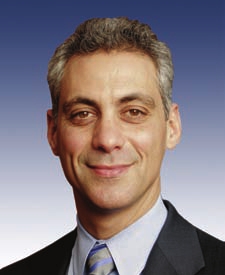Chicago Mayor Halted Pension Crisis, But Leaves Big Bills Ahead

published Oct 18, 2018, 11:39:45 AM, by Elizabeth Campbell
(Bloomberg) —
Chicago Mayor Rahm Emanuel gave city council members a parting gift by proposing a 2019 budget that doesn’t ask them to raise taxes ahead of February’s municipal election. But it leaves a heavy lift for his successor.
The next mayor, who will take over in May, will see Chicago’s required annual contribution to the city’s four pension funds double from about $1 billion in 2018 to $2.1 billion in 2023, city documents show.
During his tenure, Emanuel has put all four retirement plans on a path to solvency and already boosted contributions to the funds, raising property taxes and utility fees to cover those bills. While that made headway toward arresting mounting financial strains that caused Moody’s Investors Service to downgrade Chicago’s bonds to junk grade, his plan delayed until after he left office a big jump in payments needed to pay down a $28 billion debt to the retirement system that built up years before he took office.
“What a lost opportunity,” said Dora Lee, vice president at Belle Haven Investments, which manages about $7.5 billion in municipal bonds, including Chicago debt. “This is the time to do something bold and expend the last of your political capital to really put Chicago on a better path, instead of waiting for the next person to deal with the problem.”
“He was so bold in his prior budgets, and he did make such great strides in years before in setting Chicago up on a more sustainable path, that this budget was kind of like ‘oh, okay,’ ” Lee said. “I wanted to see given his boldness with previous budgets a little bit more vision.”
Emanuel, a two-term Democrat who has decided not to run again, on Wednesday proposed a $10.7 billion spending plan for 2019. The 2019 budget speech touted his work since taking office in 2011, highlighting investments in education, public safety and steps to steady the pensions after the city shortchanged them for years.
“There’s no doubt that the mayor can take credit for stabilizing the city’s finances,” said Laurence Msall, president of the Civic Federation. “He leaves the city after 8 years in much better financial shape than he found it, but the challenges going forward are real.”
Emanuel thanked the council for taking the hard votes to steady the city’s finances and acknowledged that there is still more work to do.
“They do not build statues for people who restore fiscal stability,” Emanuel told a packed council chamber on Wednesday. “But without sound, strong, stable finances, nothing else is possible. Breaking news, you’re not going to get a statue. But you have built something more important, more fundamental, and more lasting than any statue. You have built a foundation.”
The pension bills will jump because the city will have to pay what actuaries say is needed into the public safety funds starting in budget year 2020 and in 2023 for the municipal employees’ and laborers’ plans. That means not only covering what it owed for newly earned benefits, but making up for the shortfall that resulted from years of not paying the full amount.
While Emanuel isn’t running for re-election in February, the aldermen who have to vote to approve the budget are on the ballot.
“Politically it’s difficult to address things like that in an election year,” said Neene Jenkins, a vice president and municipal analyst at AllianceBernstein, which oversees $42 billion of state and local bonds, includes some Chicago debt.
Chicago Chief Financial Officer Carole Brown told reporters that Emanuel is planning to have a more comprehensive discussion around pensions and speak to what he thinks is necessary to help address that issue. That may happen in December, she said. Brown has said that the city hasn’t ruled out issuing pension-obligation bonds to pay off a big chunk of the pension debt.
Near the end of his final budget speech, Emanuel warned his successors to stay fiscally disciplined.
“If our leaders run up debt, run down pensions, run dry the rainy day fund, it is the next generation whose chances will run out,” Emanuel said.
To contact the reporter on this story: Elizabeth Campbell in Chicago at ecampbell14@bloomberg.net To contact the editors responsible for this story: James Crombie at jcrombie8@bloomberg.net William Selway, Christopher Maloney
COPYRIGHT
© 2018 Bloomberg L.P



No Comment